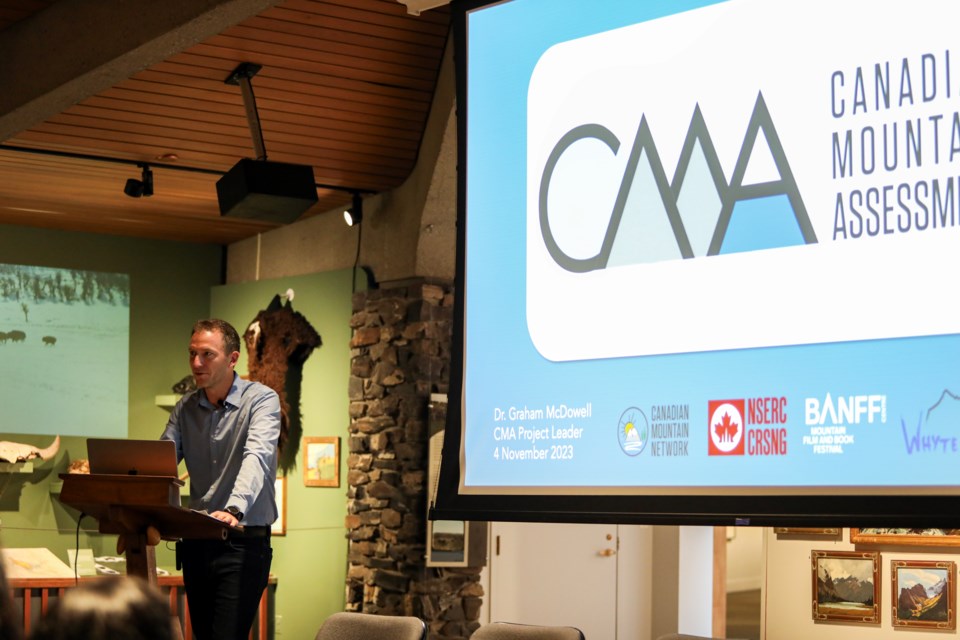BOW VALLEY – There is a wealth of knowledge on mountain systems that spans so far and wide it could put some of the most expansive mountain ranges to shame.
Yet, until now, much of what is known or studied about mountains in Canada has been fragmented – split between western science and Indigenous ways of knowing.
Canadian Mountain Assessment, a new anthology book released during the Banff Centre Mountain Film and Book Festival, aims to bridge this divide and provide the most comprehensive understanding of what is known about the country’s peaks and ranges, and what isn't.
Canmore resident Graham McDowell, who led the project, is a postdoctoral associate in geography at the University of Calgary. He said, from a high level, the publication highlights the connection many people feel with mountains.
“We can say, quantitatively, how much area is covered by mountains, how many people live there, how much water is provided. But we also learned so much about the importance of mountains as homelands for Indigenous peoples and the ways they’ve lived in those spaces since time immemorial; the spiritual, cultural, medicinal, sustenance connections that many people have to mountains,” he said.
In short, a key insight of the anthology is “just how much mountains matter.”
Each chapter of the 376-page book, which has 80-plus contributors and sources data from countless other studies on mountain-related research, is co-authored by an Indigenous and non-Indigenous person. It took three-and-a-half years to finish.
One of the chapters discusses mountains as homelands to First Nations, Métis and Inuit people, where many lived long before the arrival of colonialism.
“Accordingly, many Indigenous territories and linguistic regions are associated with mountain areas. These mountain areas have been sustained but also been stewarded by Indigenous peoples who continue to know and care for them,” said McDowell.
“Likewise, and more recently, non-Indigenous people have come to live in mountains across the country and have lives and livelihoods that are deeply woven with the specificities of mountain areas.”
By the numbers, 1.3 million people live within mountain areas in the country, according to the book.
With a 100-kilometre buffer, which McDowell noted is commonly done for areas like coasts and other geological features, 82 per cent of the population in Canada lives within or adjacent to mountains.
“That’s globally unique and it indicates that mountains are, again, an important part of our socio-cultural fabric in this country,” he said.
It also highlights some of the unique pressures mountain environments are under.
The assessment looks at key issues like climate change, evolving land use, tourism and recreation, population growth, and invasive species encroachment, all of which exert pressures on mountain ecosystems.
Joseph Shea, a climate geoscientist at the University of Northern British Columbia, highlighted a map in the anthology that compiles two decades of glacial melt data in Canada. He said it starkly underscores the significant influence of mountains and shifting climate on populations across the country.
“It’s a stunning map if you look at it. There are a couple hot spots, we would call them, where things are receding more rapidly like glaciers on the eastern slopes here in the Rockies, but glaciers in the arctic cordillera are responding the same way as glaciers in the coastal mountains, the same way as glaciers in the Torngat [Mountains],” he said.
“It’s a uniform picture. And for me, that really kind of brought home one of these pressures which is global in scope. That viewpoint is colouring everything that we look at going forward and how we adapt to these changes.”
Lhu’ààn Mân Ku Dań elder Gùdia Mary Jane Johnson, who formerly worked for Parks Canada, was similarly struck by the universality of changing mountain landscapes. Johnson is from Kluane First Nation in Yukon. She said she took note of the Stoney Nakoda Exshaw wildlife overpass being built on the Trans-Canada Highway while on her way to Banff to help launch the book.
Johnson said where roadways and infrastructure can fragment wildlife habitat and movement, she is glad to see some adaptations being made.
“I know that there are other Nations in North America that use that kind of thinking of land connection in regards to the dissecting of homelands,” said Johnson. “But for all of our relations that are using that walkway that is on that highway, thank you, because that keeps them connected on their homelands as well.”
During learning circle discussions for the book, an empty chair was always left for those relations – the animals, trees, “all those not physically here with us,” Johnson explained.
She called the approach to the anthology “multi-generational, multi-disciplinary, and multicultural.” But it was important that it also be authentic and respectful, while preserving and protecting the integrity of contributed Indigenous stories.
The project was committed to upholding the integrity of Indigenous stories, enacting ongoing consent and ensuring open access and transparency in its work, McDowell noted.
“We have worked with our publisher, the University of Calgary press, to make it possible for contributors to request the removal of any stories or knowledge that might be deemed inappropriate to share into the future,” he said.
McDowell described the Canadian Mountain Assessment as a first-of-its-kind publication. He hopes it can inform, inspire and propel new research on mountain systems.
The anthology book is available to view and download free at: https://ucp.manifoldapp.org/projects/9781773855103.
The Local Journalism Initiative is funded by the Government of Canada. The position covers Îyârhe (Stoney) Nakoda First Nation and Kananaskis Country.




